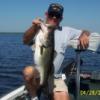This is an interesting question in that the answer isn't black/white simple. Bass will eat bass fry, but it pretty much ends there with an exception.
Bass belong to a family of fish that are for all intents and purposes are schoolers. If blatant cannibalism was allowed in this society you would have only a few large bass living in any body of water. In this respect, they are not cannibals.
So:
Fry eaters: yes
Bigger than fry eaters: no
Oops: bass don't live by rules! There is that guy/gal out there that is a full time cannibal given the opportunity. The illustrious loner, or rougue-bass. That's the fish that you note running about the lake in pursuit of its food. (see you ask a simple question and then it gets complicated)
I must regress: Bass live in schools, but not for protection as is the case for most fish that we call schoolers, but rather for cooperative hunting. This is not the hunting school akin to the roving blue fish however. This is a school that lies in wait for opportunity using each other's eyes and senses. Some of the school will be looking up for the inevitable school of bait to come by and all the rest of the school will be looking at those that are watching. When one of those that is looking up spots opportunity, those that are watching will follow suit. If the activity and opportunity are large enough the whole school may join in: this being that shad bust that is so often mis-called schooling activity. I say mis-called, because the bass were already schooled. Once the shad pass through the area the bass regroup into their previous positions waiting for the next chance to come their way.
Outside of these schools of bass lives that rogue or cannibal bass. Because of his unorthodox behavior of ingesting his own kind he isn't able to join in and use this societal activity for his hunting. You will see him out and about the lake as he smashes and chases food. If you are lucky enough to be near him/her on one those smashes you just might latch on, and the ensuing fight is going to be most interesting. You are going to think that this bass is on steroids. This bass, rather being the fatty occupant of the school that spends their time waiting for opportunity, must chase its food, and in the process becomes much more muscled than the rest.
What happens when one of these eaters of their own, heads into the school looking for an easy meal from the masses? I have seen this happen over and over again where and when it was clear enough to observe. The entire school, or those that sense its presence will turn and attack the intruder. How this bass is marked to be different from the rest I don't know, but marked he/she is. Sometimes they are lucky and carry off a hapless unattentive bass, but most often they are chased off before they can accomplish their intentions.
How much of it's life does the normal bass spend in a school? Basically most of it: the school may be loose, or it may be more compact when feeding, but this critter is a schooler. They are even in the school during the spawning activity. If they were all cannibals there would be but a few survivors with those being rather huge.
Next time you are out there and you see that big splash, and by the time you get to the area of the splash it occurs just out of your reach in another spot, with this repeating itself again and again, you are probably looking at that cannibal. Concentrate on locating the school and tend to business, for that guy/gal will more than likely come to you as he makes his daring run, blasting through the ranks in search of an easy meal.








